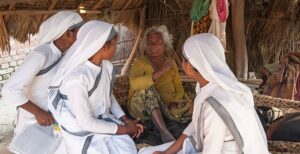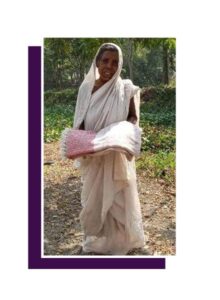Raise funds for Widows
There are many ways you can fundraise, whether it’s a bake sale, a marathon, or a party!
This website will offer limited functionality in this browser. We only support the recent versions of major browsers like Chrome, Firefox, Safari, and Edge.

Like this widow, Saadet was lonely and in need. She, too, received a visit from a team of Sisters of Compassion, and they cared for her needs.
Saadet had sought prosperity and blessing by worshiping traditional gods, but her life had been anything but prosperous. Her husband had been addicted to alcohol and had eventually succumbed to health problems. Women in her region are typically defined in terms of their relation to their husbands, and with her husband’s death came the end of Saadet’s social standing. In her society, when a man dies, his family members usually endure a period of mourning, but a widow’s mourning—and its “death impurity”—often doesn’t cease, says anthropology professor Sarah Lamb. As a result, widows may be forced to refrain from sharing food or interacting socially for the remainder of their days.
One might assume that Saadet’s two grown sons would support their aging mother, but they did little to take care of her. Her youngest son provided a small room. At least Saadet had a roof over her head. In a region where widows are often ostracized and shunned, it wasn’t uncommon for adult children to cast their widowed mother out of their home.
But a room was the extent of her sons’ care for Saadet.
With no joy or peace of mind, Saadet suffered through life essentially alone. Though her children didn’t drive Saadet from their home, perhaps they made it clear her role among them had ended. Burdened by the misfortune of having outlived her husband, many a widow in Asia experiences what psychologist Vasantha Patri describes as being “physically alive but socially dead.”

Saadet (pictured) was grateful for the warm shawl she received as a demonstration of Christ’s love.
Saadet struggled to survive, with only a weekly rice ration from a welfare agency to eat. Perhaps some people thought it appropriate that in Saadet’s “new role as an eternally diminished mourner,” her meals would be limited to small portions of bland food.
But her poor nutrition was an example of the health problems many widows face worldwide. Other issues include inadequate housing, vulnerability to violence and lack of access to healthcare.
Widows such as Saadet commonly face economic hardship. They may be stripped of their land, denied access to their inheritance or refused employment. As a result, approximately one in ten widows worldwide live in extreme poverty.
If she were a younger woman, perhaps Saadet could overcome the discrimination and earn some sort of living, but at 65, her aging body lacked the strength for work. She struggled just to care for herself. As a woman, Saadet was also less likely to have access to old age pensions than a man, a reality that can lead to destitution for older widows.
It was a lonely, pitiful existence for Saadet, but what hope did she have of anything better? She was a widow in a land where widows are often considered cursed and frequently shunned. She seemed destined to a life void of happiness for the rest of her days.
One day, a team of GFA Sisters of Compassion visited Saadet’s village and met the elderly widow. Saadet’s home was unkempt; her body and clothes were unwashed. Yet, where others saw disgrace, the Sisters saw a precious woman in need. They listened to Saadet as she shared her sorrows. They saw her frailty. They cared about her woes.
Their hearts were provoked to action, and the sisters returned to lend helping hands. They cleaned Saadet’s house, helped her bathe, trimmed her nails and washed her clothes. The Sisters became frequent visitors, helping Saadet in whatever ways they could, demonstrating Christ’s unconditional love through their service. Saadet was amazed. All this for a lowly widow? What could motivate these women to care for her so fully?
“Jesus Christ is with me, … I thank Him for the life of the Sisters of Compassion … who are still taking care of me by cleaning my house, cooking food, applying oil and combing my hair. I am extremely happy for this, and I thank God and the leadership of [the church].”
It was Jesus. Jesus was loving her through these women, His disciples. As a result, Saadet fell wholeheartedly in love with Him. She began attending worship services and learning from God’s Word. Saadet discovered peace and joy.
“Jesus Christ is with me,” Saadet said. “I thank Him for the life of the Sisters of Compassion … who are still taking care of me by cleaning my house, cooking food, applying oil and combing my hair. I am extremely happy for this, and I thank God and the leadership of [the church].”
Later, when temperatures dropped, Saadet received a delightful surprise: The local church provided her with a warm shawl to protect her from the cold. With a grateful heart, Saadet confessed she had been praying for such provision since she had only old and torn clothes to wear. Answered prayers continued when Saadet’s children also embraced Christ as their Savior. Her youngest son, with a changed heart, began providing full financial support for his aging mother. No longer neglected or alone, Saadet now has a life full of joy and fellowship.
Many other widows remain destitute. According to the United Nations, “Millions of the world’s widows, of all ages, endure extreme poverty, ostracism, violence, homelessness, ill health and discrimination in law and custom. … Widows across the globe share two common experiences: a loss of social status and reduced economic circumstances.”
This “invisible” group of women has been historically unsupported and even neglected.
They need to be seen. They need to know Christ’s love. They need our help.

Widows often face many hardships after losing their husbands, both economic and social.
That’s why GFA missionaries regularly minister to widows in the communities they serve. They compassionately care for these precious women, demonstrating Christ’s love by helping them with everyday chores, listening to them, encouraging them, praying for them and providing them with food and other essentials as well as income-generating gifts to empower them to earn a living for themselves and their children.
You can partner with these missionaries and practice “pure and undefiled religion” (James 1:27) today by compassionately helping a widow in need.
There are many ways you can fundraise, whether it’s a bake sale, a marathon, or a party!